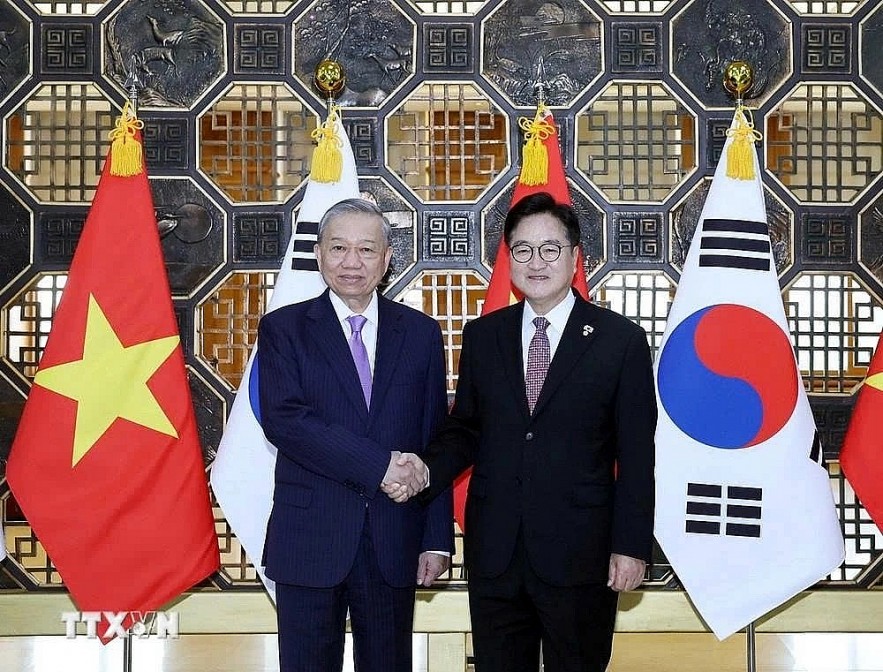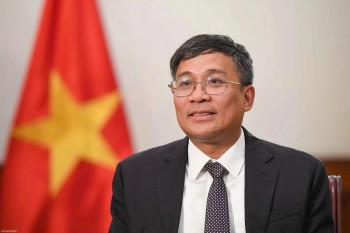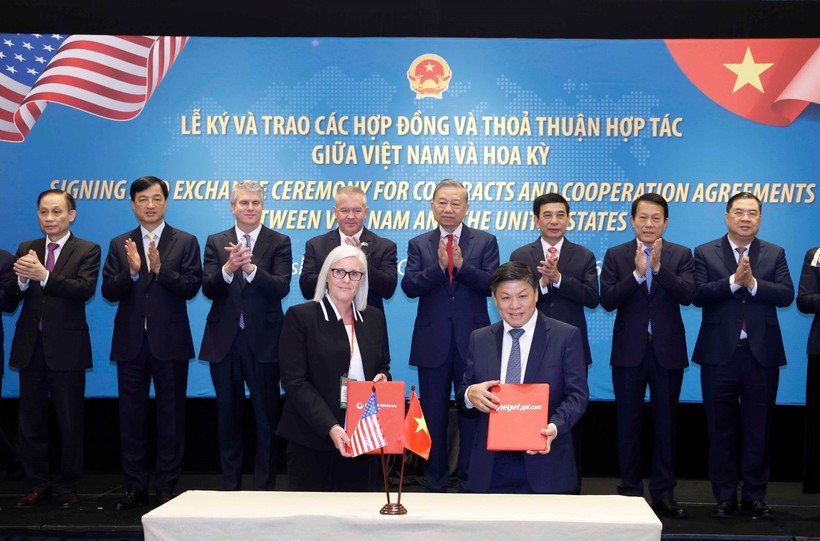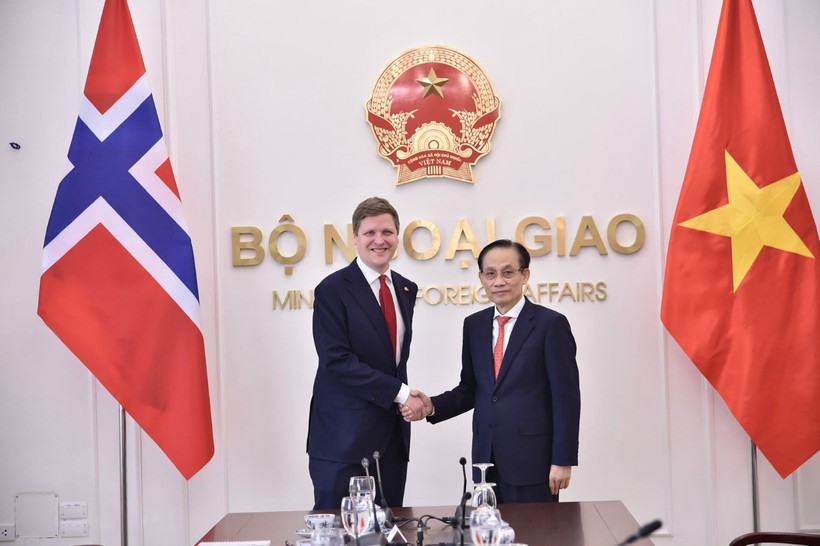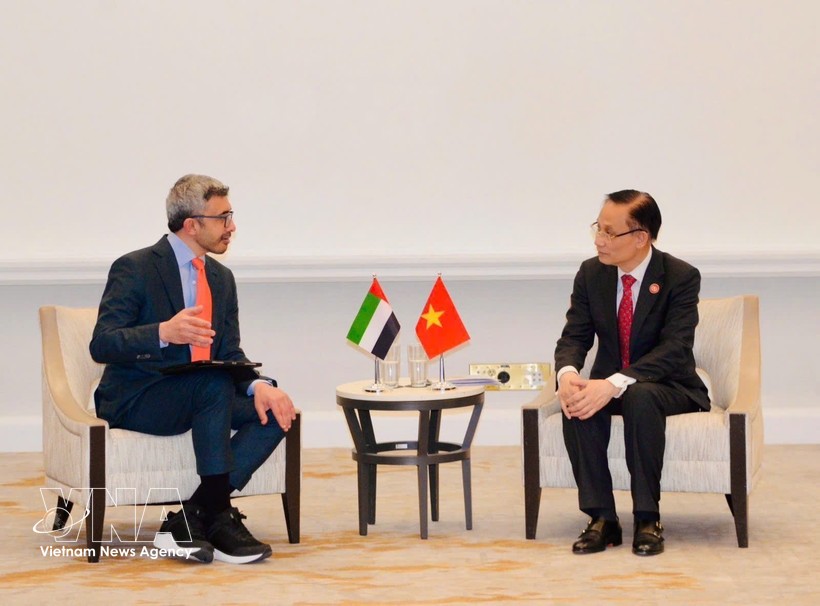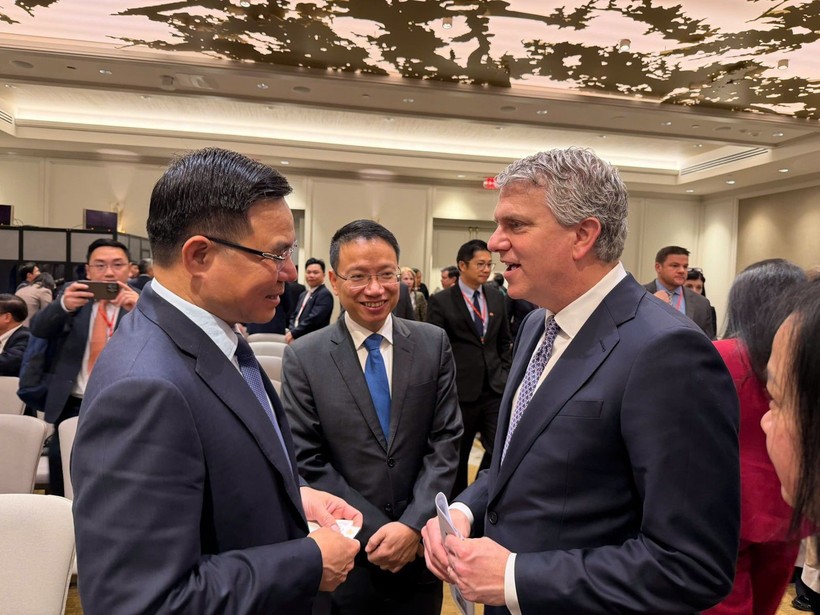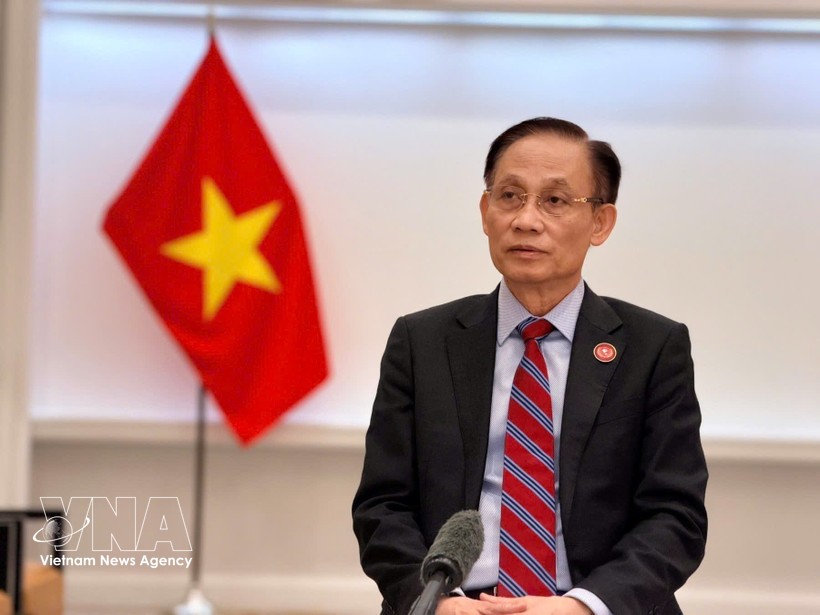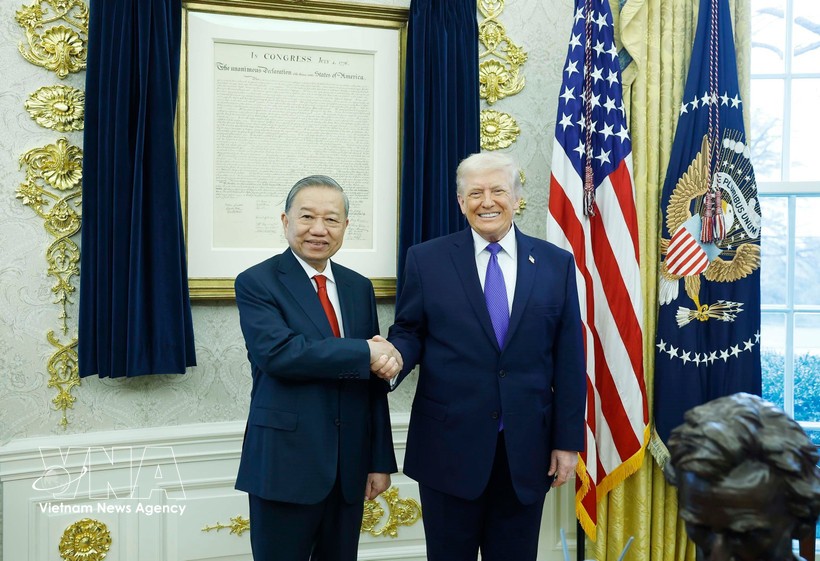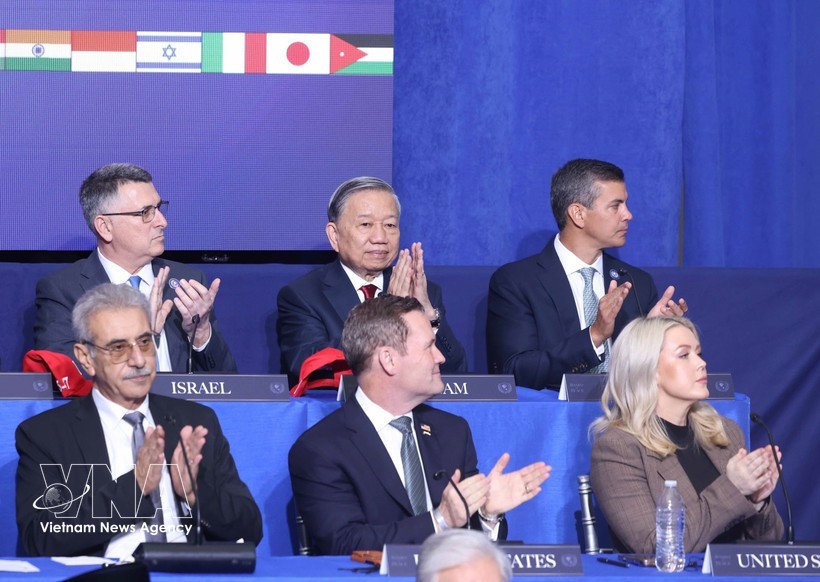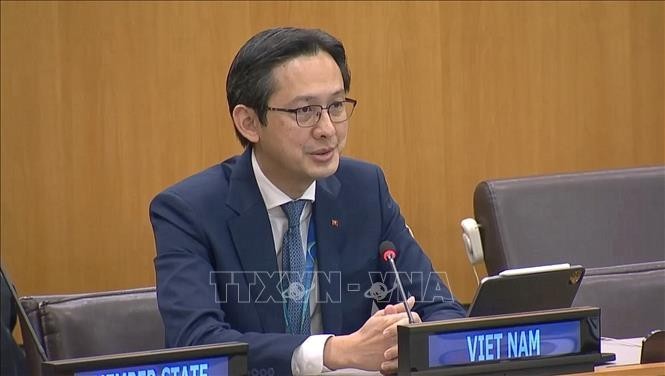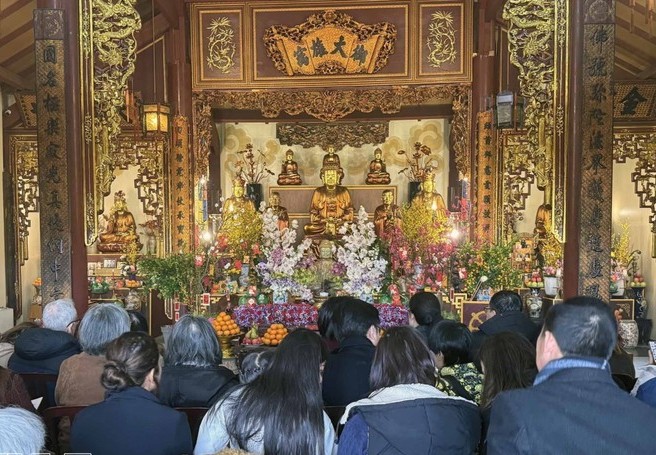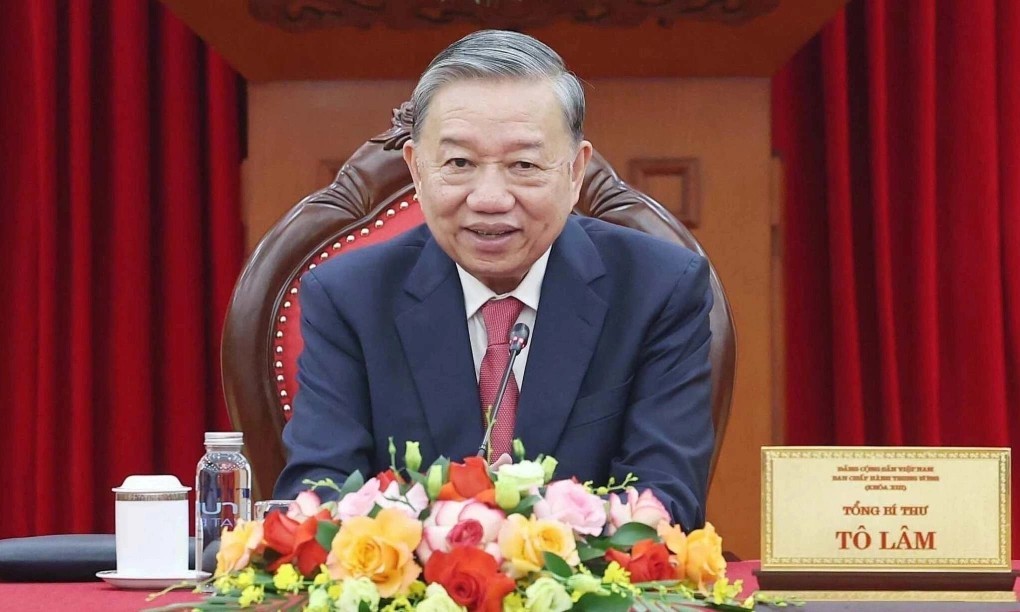Vietnam, Laos enhance SOE reform cooperation
Tran Luu Quang, Secretary of the Communist Party of Vietnam (CPV) Central Committee and head of its Commission for Policies and Strategies, had a working session in Hanoi on August 12 with a delegation from the Lao People’s Revolutionary Party (LPRP) Central Committee’s Commission for State-owned Enterprise (SOE) Reform, led by Saleumxay Kommasith, Politburo member, Deputy Prime Minister and head of the commission.
Quang described the delegation's Vietnam visit as an important and practical step in further deepening the special solidarity between Vietnam and Laos. He congratulated Laos on its achievements in implementing the Resolution of the LPRP’s 11th National Congress, and expressed his satisfaction at the increasingly substantive and effective cooperation between the two Parties and States across a wide range of fields.
He underlined that the exchange of experience in building socio-economic development policies, refining institutions and policies, and particularly in SOE reform, is a practical and significant approach that contributes to maintaining stability and fostering development in both countries.
Quang briefed the Lao delegation on the CPV and State’s key orientations, guidelines and policies for SOE restructuring and reorganization. He emphasized that SOE reform in Vietnam has always been conducted under the Party leadership, identified as a central task to strengthen the leading role of the state sector while promoting sustainable growth, according to VNA.
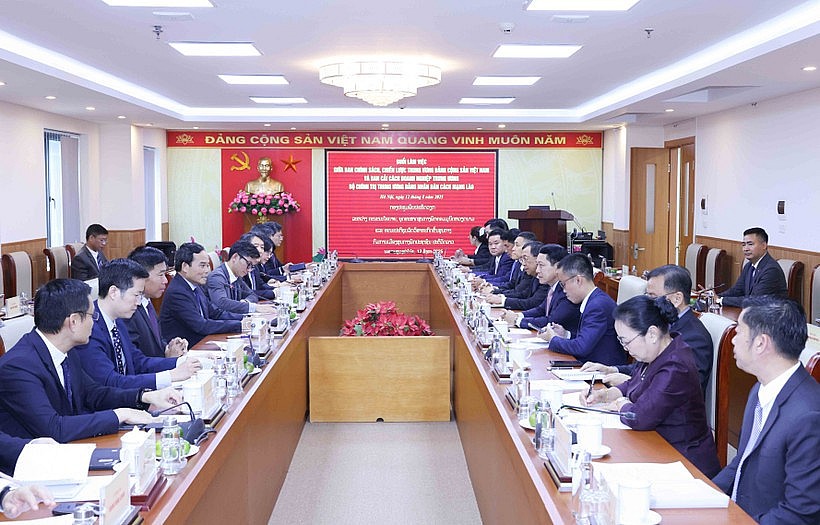 |
| At the working session (Photo: VNA) |
The host shared Vietnam’s experience in building a transparent and coherent legal framework, balancing state management with enterprise autonomy, modernising governance mechanisms, and improving the capacity of managers and workers. He discussed the challenges encountered during the reform process and the lessons drawn from the Party’s leadership and guidance in practice.
For his part, Kommasith expressed his pleasure at visiting Vietnam and thanked Quang for sharing of valuable experience. He congratulated Vietnam on its historic achievements in the Doi Moi (Renewal) process, describing them as an inspiration for Laos, and voiced confidence that under the CPV’s leadership, the Vietnamese people will continue to secure new successes and advance into a new era of national development.
The Lao Deputy PM noted that Vietnam’s experience in SOE management and development shares many similarities with Laos’s circumstances, especially as the country accelerates economic reform and deepens international integration. He outlined Laos’s recent economic progress and the challenges it faces in SOE reform, stressing that Vietnam’s lessons in legal framework building, policy refinement, governance innovation and operational efficiency will be valuable for Lao enterprises.
Vietnam and Australia ink three-year defense cooperation plan
Vietnam and Australia signed a defense cooperation plan for the 2025–2027 period following the 8th Defense Policy Dialogue between the two countries, held in Hanoi on August 12.
The dialogue was co-chaired by Senior Lieutenant General Hoang Xuan Chien, Deputy Minister of National Defense of Vietnam, and Hugh Jeffrey, Deputy Secretary of Strategy, Policy, and Industry at the Australian Department of Defense.
Gen. Chien emphasized that since the 7th dialogue in March 2024, defense cooperation between the two sides has been actively and effectively implemented across many fields, commensurate with their Comprehensive Strategic Partnership. Exchanges of delegations and contacts at various levels, especially high-level, have been well maintained. Significant progress has been made in cooperation on training, United Nations peacekeeping, branch-level collaboration, information sharing, military medicine, post-war remediation, search and rescue, and the defense industry.
The Vietnamese Ministry of National Defense also expressed support for the ASEAN-Australia Comprehensive Strategic Partnership and appreciated Australia’s proactive role in regional multilateral mechanisms such as the ASEAN Defense Ministers’ Meeting Plus (ADMM+), as well as organising the first-ever Australia-ASEAN High-Level Defense Dialogue in May 2025.
Gen. Chien proposed that both sides continue to strengthen cooperation and effectively implement activities such as delegation exchanges, branch-to-branch and military medicine cooperation, post-war remediation, defense industry, border management. He also proposed that the two sides effectively implement the 2025 – 2027 cooperation plan within the framework of the recently signed Peacekeeping Partnership Agreement, while closely coordinating in multilateral activities, especially within ADMM+, cited VOV.
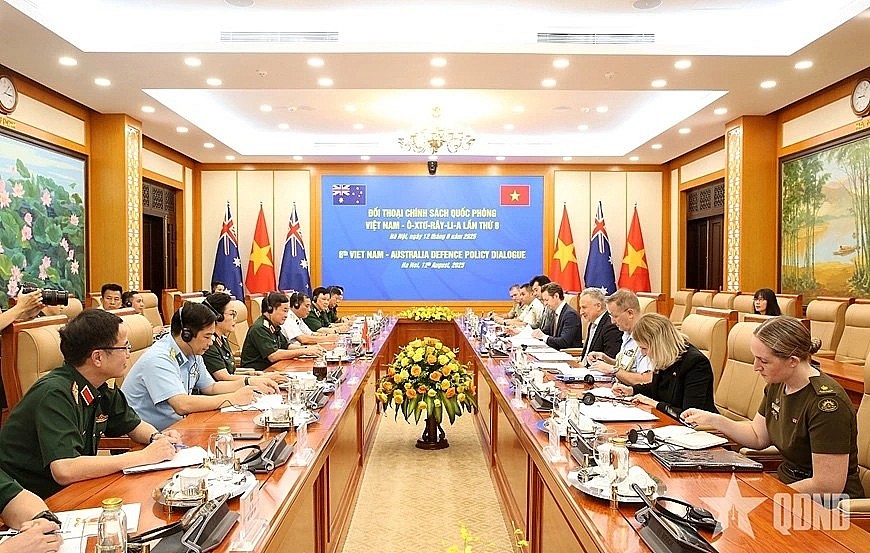 |
| Senior Lieutenant General Hoang Xuan Chien, Deputy Minister of National Defense of Vietnam, and Hugh Jeffrey, Deputy Secretary of Strategy, Policy, and Industry at the Australian Department of Defense, co-chair the 8th Defence Policy Dialogue between the two countries in Hanoi on August 12. (Photo PANO) |
According to the Deputy Minister, training cooperation is the foundation of the defense relationship between the two countries. He hoped Australia would consider increasing the number of university and master’s scholarships for sectors Vietnam needs, while welcoming Australia sending personnel to study Vietnamese at the Military Science Academy and attend international defense officers courses at the National Defense Academy of Vietnam.
Australia’s Deputy Secretary of Defense Hugh Jeffrey, for his part, affirmed that Vietnam is an important partner and that defense cooperation has become a key pillar in bilateral relations. He expressed hope that both sides would explore expanding cooperation into new areas suitable to their potential and mutual interests.
During the dialogue, both sides exchanged views on global and regional issues of shared concerns. Gen. Chien affirmed that Vietnam remains steadfast in its foreign policy of independence, self-reliance, peace, friendship, cooperation, and development, guided by the “Four No’s” Defense Policy. Vietnam is committed to resolving all disputes in the East Sea peacefully, based on international law, especially the 1982 United Nations Convention on the Law of the Sea (UNCLOS 1982), respects the Declaration on the Conduct of Parties in the East Sea (DOC), and promotes the early conclusion of a substantive, effective, and practical Code of Conduct (COC).
Jeffrey emphasized that Australia and Vietnam share common visions and perspectives on many regional and international issues. Regarding the East Sea, he said, Australia supports the viewpoint of respecting sovereignty of involved countries and peaceful dispute resolution in accordance with international law.
Vietnam helps Cuba improve law making and enforcement capacity
Vietnam and Cuba on Monday signed a cooperation agreement on technical assistance project to enhance Cuba’s capacity for law making and enforcement.
It marks the first institutional technical assistance project that Vietnam has ever offered to another country.
The agreement was inked by Minister of Justice Nguyen Hai Ninh and his Cuban counterpart Oscar Manuel Silveira Martínez on the occasion of the Vietnamese official's visit to Cuba from August 11-13.
The assistance includes sharing Vietnam's experience in legal reform, supporting digital transformation in the judicial sector, and providing 200 modern computers for the Cuban Ministry of Justice.
Both ministers agreed that this agreement will significantly enhance the ministry's capacity to carry out its functions and improve the quality of services, VGP reported.
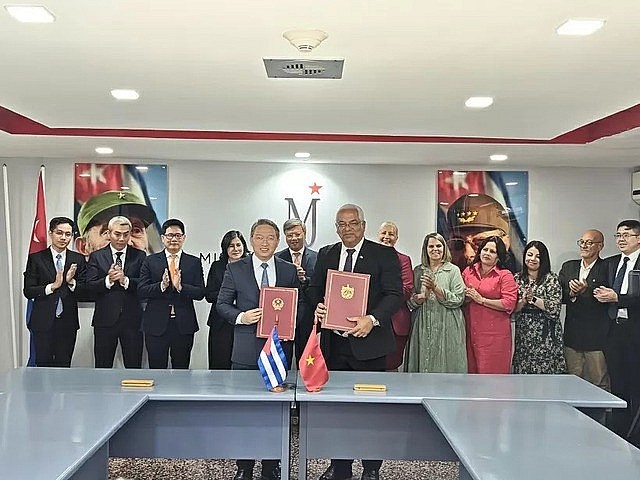 |
| Minister of Justice Nguyen Hai Ninh (L) and his Cuban counterpart Oscar Manuel Silveira Martínez sign a cooperation agreement on technical assistance project to enhance Cuba’s capacity for law making and enforcement, La Habana, Cuba, August 11, 2025 |
Bilateral legal cooperation has been established since the signing of the Memorandum of Understanding on cooperation in 2013, with six cooperation programs and eight high-level exchange delegations.
Since then, the two sides have signed numerous agreements to promote specialized training, exchange experiences in registration and notarization work, digitize services, study legislative drafting techniques, and share professional materials.
In particular, cooperation has been further strengthened following the visit to Cuba by General Secretary and President To Lam in September 2024, reaffirming the determination to advance bilateral cooperation beyond all challenges.
On August 11, Nguyen paid a courtesy visit to First Secretary of the Communist Party of Cuba (CPC) Central Committee and President of Cuba Miguel Díaz-Canel.
The Cuban leader noted that the visit created an opportunity for the Ministries of Justice of the two countries to exchange experiences in the processes of developing legal norms.
He spoke highly of Vietnam's initiative for legal technical assistance for Cuba.
Vietnam’s EV market attractive to both domestic, foreign manufacturers
As Vietnam’s electric vehicle (EV) market is booming and not a “playground” of a single business, both domestic and foreign enterprises are accelerating to occupy this promising market.
The market is seeing a strong investment inflow, from both domestic firms and international corporations. Recently, LG Energy Solution, a leading global battery manufacturer from the Republic of Korea (RoK), announced its plan to invest in an electric motorbike factory and charging station in the northern province of Phu Tho.
The group’s intention to invest in Vietnam through official development assistance (ODA) is considered as a positive sign for the domestic energy industry and green transport development.
Facing the rising competition, domestic companies are promoting production and expanding their market shares. VinFast, an EV manufacturer of Vietnam, has set a target of raising its capacity of producing electric motorbikes to 1 million units a year, and venturing into new segments, including mini electric cars and electric trucks.
Dat Bike – a prominent startup in this field – is planning to triple the scale of its factory in Ho Chi Minh City, and expanding its coverage in the southwestern region. Notably, it is developing mobile maintenance and warranty services, a model welcomed by local consumers.
Domestic manufacturers like VinFast, Yadea, Selex, Dat Bike, and Pega now have a combined production capacity of 1.8 million units per year, close to the level that meets the new consumption trend. Meanwhile, foreign-invested Honda and Yamaha are also launching some EV models, expected to trigger a domino effect on other foreign brands such as Piaggio, Suzuki, and SYM, VNA reported.
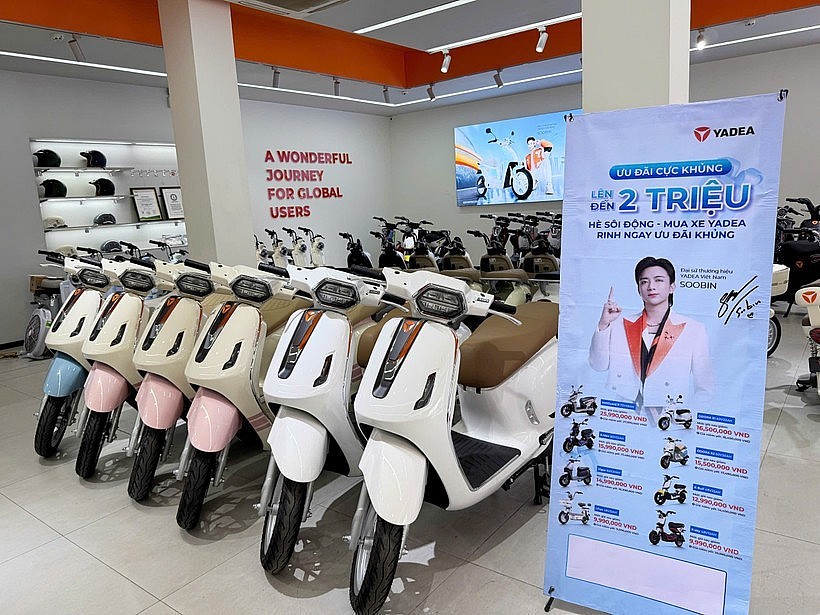 |
| Domestic manufacturers like VinFast, Yadea, Selex, Dat Bike, and Pega now have a combined production capacity of 1.8 million units per year. (Photo: VNA) |
Going beyond selling EVs, many foreign companies are eyeing to boost the rates of locally made components and long-term investment in Vietnam. BYD, the largest EV manufacturer in China, is reportedly making a survey to open a plant in Vietnam, while the RoK’s Hyundai is intensifying its supply chain in the country.
Mercedes-Benz, BMW, Audi, and Porsche are also introducing their high-class EVs, targeting local high-income earners.
According to experts, the Vietnamese EV market is entering an important transition stage, and this race sees the involvement of technology, services, infrastructure and policies.
The roadmap to restrict the use of petrol-powered vehicles and encourage green ones in such major cities as Hanoi and Ho Chi Minh City is creating a strong boost to the EV market. Thorough preparations, not only in product but also in services, maintenance and charging stations, are believed to be key to the success of enterprises in this field.
Currently, several localities like Hanoi, Da Nang city, and Ho Chi Minh City are taking measures to support investors in developing charging stations like land lease fee exemption and location planning.
However, experts stressed the need for the early issuance of common technical standards for batteries and charging stations, as well as green credit policies and incentives in terms of electricity prices.
RMIT forecast the Vietnamese EV market may reach 6.7 billion USD by 2030, with an average growth rate of 18% annually.
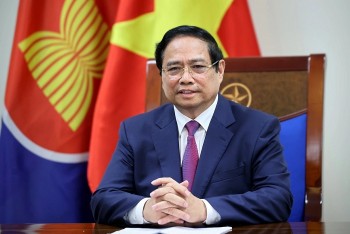 | Vietnam News Today (Aug. 9): Vietnam Vows to Contribute Actively to ASEAN Community Building Efforts Vietnam News Today (Aug. 9): Vietnam vows to contribute actively to ASEAN Community building efforts; Vietnam encourages Japanese firms to invest in key sectors: NA ... |

